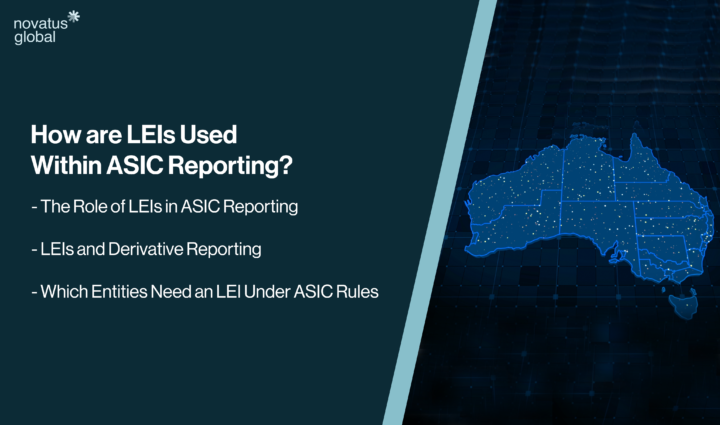
Introduction to LEIs and Their Role in ASIC Reporting
Legal Entity Identifiers (LEIs ) are unique 20-digit alpha-numeric codes that are used to identify a legal entity on a global database, providing transparency over financial transactions.
LEIs have been considered the preferred reporting identifier of the Australian Securities and Investments Commission (ASIC) since 2013. They were first introduced within ASIC as part of the ASIC Derivative Transaction (Reporting) Rules which mandated LEIs should be used by counterparties to identify OTC transactions for regulatory purposes.
Since October 2024, ASIC has stipulated that only LEIs will be accepted for reporting purposes, and other codes such as AVID and BIC will no longer be used. For this reason, entities involved in the Australian financial services industry need to understand what an LEI is and how it is used for ASIC reporting.

Why ASIC Requires LEIs for Derivative Reporting
Before the introduction of LEIs to ASIC reporting requirements, ASIC required the reporting of AVID codes (an international business identifier issued by AVOX) or BIC codes (Bank Identification Codes) to identify businesses involved in a transaction, and individuals would be identified using a client code.
Although LEIs have been used in Australian financial services since 2013, new regulations as part of the ASIC Rewrite have now made them compulsory. The ASIC Rewrite went live on the 21st of October 2024, and involved several key changes for the industry, including the compulsory use of LEIs. The Rewrite aligns ASIC with global reporting standards already established by CFTC, EMIR Refit and other regulatory bodies. The use of LEIs assists national and international regulators by identifying counterparties involved in cross-border transactions and monitoring financial stability.
Eligibility: Which Entities Need an LEI under ASIC Rules
The European Market Infrastructure Regulation (EMIR) has mandated the use of LEIs for reporting of European entities since 2018. This applies to all transactions for buying, selling or issuing financial instruments on EU-regulated markets. The same now applies to Australian firms when they are trading and reporting on Australian financial markets, and also if conducting activities within the EU, UK or US.
After the ASIC Rewrite 2024, LEI codes are required for firms that fall under any of the following criteria:
-
-
- OTC derivatives (private individuals are exempt)
- Self-Manged Superannuation Fund traders and trustees
- Commodities
- CFDs
- Securities
-
Obtaining and Maintaining an LEI for ASIC Compliance
Those who require an LEI code to fulfil their ASIC reporting obligations need to complete a basic entity information form, using an authorised LEI issuer. LEIs require an annual renewal, which involves updating any information related to the entity that has changed since the last renewal.
There is often a registration fee involved in setting up and maintaining an LEI code. Once registered and after the issue of the LEI, the legal entity is responsible for maintaining the information behind and renewing the LEI.
The October 2024 Rewrite mandated the LEIs used as entity identifiers for reporting counterparties must be renewed and remain valid at all times. Valid LEIs should then be filed to the trade repository alongside other reportable information.
This change aims to improve the quality and accuracy of LEI information for market regulators.
Ensuring LEI Reporting Compliance and the Future of LEIs in ASIC Reporting
Ensuring reporting compliance with the ASIC Rewrite is essential for firms looking to avoid costly penalties and remediation programmes. Firms obliged to report an LEI code, if not already done, should register or renew their LEI code to avoid trading disruptions and remain compliant with ASIC’s new regulations.
Novatus En:ACT is the market-leading SaaS platform, built in collaboration with a major global banking group, to ensure you meet your G20 regulatory reporting obligations in an accurate, timely and complete manner.
If you have concerns regarding your ASIC reporting requirements or LEI reporting, get in touch, and one of our experts will be happy to walk you through how our En:ACT platform can streamline your reporting obligations.









